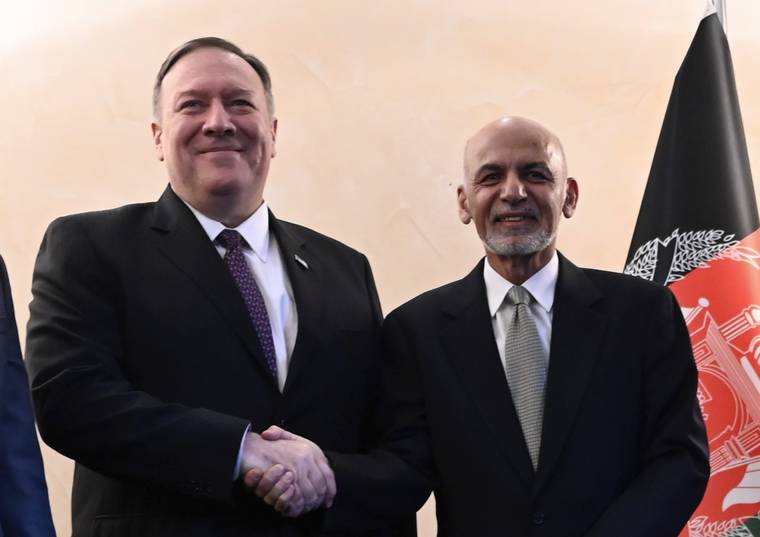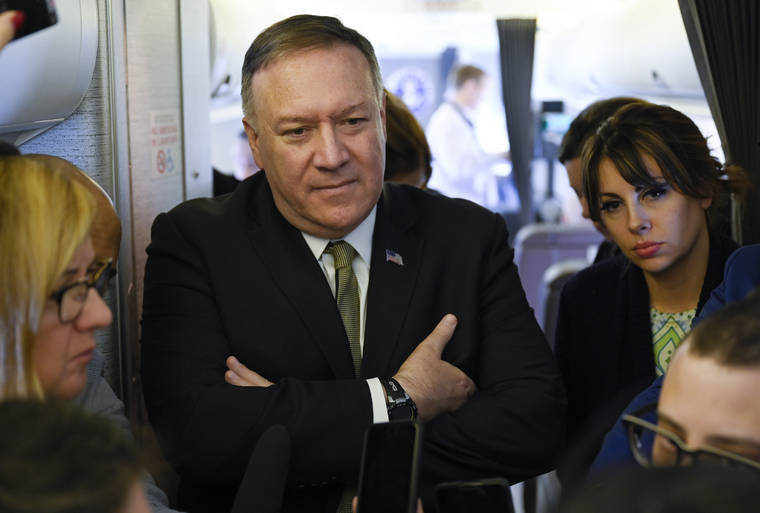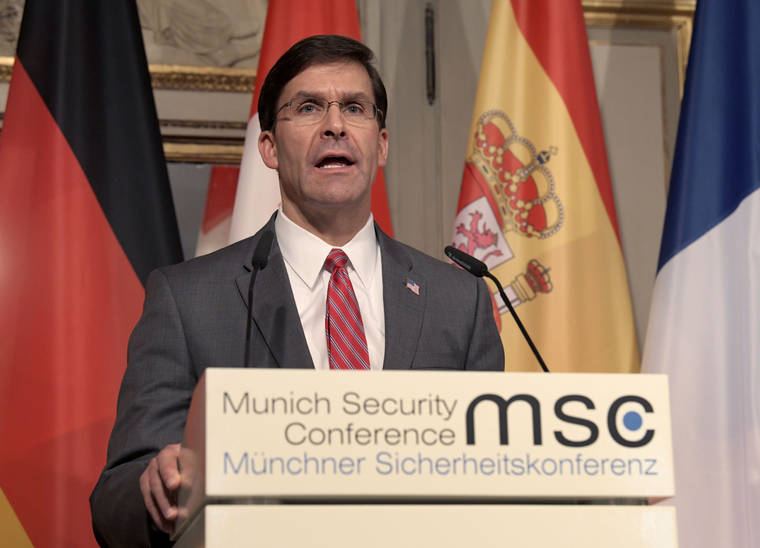U.S., Taliban reach truce deal, paving way for possible withdrawal of American troops | Honolulu Star-Advertiser

U.S. Secretary of State Mike Pompeo, left, shakes hands with Afghan President Ashraf Ghani, during the 56th Munich Security Conferenc in Munich, Germany, today.

Secretary of State Mike Pompeo takes questions from reporters during a flight from Andrews Air Force Base, Md., to Germany on Thursday.

U.S. Secretary for Defense Mark Esper speaks during a press conference on the first day of the Munich Security Conference in Munich, Germany, today.
MUNICH >> The United States and the Taliban have reached agreement on a temporary truce that will take effect in the coming days and, if successfully completed, will lead to a formal cease-fire, the start of peace negotiations between all Afghan sides next month and the ultimate withdrawal of American troops from Afghanistan, a senior U.S. official said today.
The official said the agreement for a seven-day “reduction in violence” is “very specific” and covers the entire country, including Afghan government forces. There were indications a formal announcement could come as early as the weekend.
The official, who was not authorized to publicly discuss the matter and spoke on the condition of anonymity, said the Taliban had committed to a halt in roadside and suicide bombings as well as rocket attacks. The official said the U.S. would monitor the truce and determine if there were any violations.
Should the Taliban comply, the “reduction in violence” agreement would be followed by the signing of a second agreement between the United States and the Taliban. That agreement, culminating 16 months of talks, would initiate the peace negotiations and the withdrawal of U.S. troops.
A Taliban official familiar with the deal said the second agreement would be signed on Feb. 29 and the Afghan talks would begin on March 10. The official said Germany and Norway have offered to host the talks but there has been no decision on the venue.
That Taliban official, who was not authorized to speak to the media and spoke on condition of anonymity, said the Feb. 29 agreement would provide for the release of 5,000 Taliban prisoners before the start of the negotiations.
To make good on its promise to release Taliban prisoners, Washington is going to need Afghan President Ashraf Ghani, who has been critical of the way U.S. envoy Zalmay Khalilzad has conducted the talks, complaining about being kept in the dark.
Ghani has also bickered with his partner in the current Unity Government, Abdullah Abdullah, over who will represent Kabul at the negotiating table. Ghani has insisted he lead the talks, while his political opponents and other prominent Afghans have called for more inclusive representation at the negotiating table.
The Taliban and those familiar with the details of the Afghan negotiations say the representatives from Kabul will include government officials but they will sit across from the Taliban as ordinary Afghans and not as government representatives.
President Donald Trump previously called off the peace talks because of an attack that killed two Americans.
U.S. officials have not publicly spelled out their timetable for an initial drawdown of U.S. troops in Afghanistan, but the expectation is that a reduction from the current total of about 12,000 to approximately 8,600 will begin after the signing of a U.S.-Taliban deal. That initial reduction is likely to stretch out over a period of weeks or months.
The Taliban official said the withdrawal of foreign troops would start gradually and would be carried out over 18 months.
A senior U.S. military officer told a small group of reporters that U.S. counterterrorism operations in Afghanistan against the Islamic State group and al-Qaida will continue, separate from the truce agreement. The official spoke on condition of anonymity to discuss sensitive aspects of military operations ahead of an expected announcement of the U.S.-Taliban deal.
He also said the United States has sufficient intelligence-gathering assets to be able to determine within the seven-day period whether the Taliban is making a good-faith effort to reduce violence, even if some limited violence persists.
The new developments came as U.S. Secretary of State Mike Pompeo and Defense Secretary Mark Esper met today in Munich with Ghani. They spoke on the sidelines of an international security forum in Munich.
A truce had been widely anticipated, and Trump agreed in principle to the deal, according to U.S. officials.
The final details were hammered out in recent days by Khalilzad and Taliban representatives in Doha, Qatar. Khalilzad was in Munich and attended Pompeo and Esper’s meeting as did Gen. Scott Miller, the commander of the U.S.-led international force in Afghanistan.
The official said the agreement for a seven-day “reduction in violence” is “very specific” and covers the entire country, including Afghan government forces. There were indications a formal announcement could come as early as the weekend.
The official, who was not authorized to publicly discuss the matter and spoke on the condition of anonymity, said the Taliban had committed to a halt in roadside and suicide bombings as well as rocket attacks. The official said the U.S. would monitor the truce and determine if there were any violations.
Should the Taliban comply, the “reduction in violence” agreement would be followed by the signing of a second agreement between the United States and the Taliban. That agreement, culminating 16 months of talks, would initiate the peace negotiations and the withdrawal of U.S. troops.
A Taliban official familiar with the deal said the second agreement would be signed on Feb. 29 and the Afghan talks would begin on March 10. The official said Germany and Norway have offered to host the talks but there has been no decision on the venue.
That Taliban official, who was not authorized to speak to the media and spoke on condition of anonymity, said the Feb. 29 agreement would provide for the release of 5,000 Taliban prisoners before the start of the negotiations.
To make good on its promise to release Taliban prisoners, Washington is going to need Afghan President Ashraf Ghani, who has been critical of the way U.S. envoy Zalmay Khalilzad has conducted the talks, complaining about being kept in the dark.
Ghani has also bickered with his partner in the current Unity Government, Abdullah Abdullah, over who will represent Kabul at the negotiating table. Ghani has insisted he lead the talks, while his political opponents and other prominent Afghans have called for more inclusive representation at the negotiating table.
The Taliban and those familiar with the details of the Afghan negotiations say the representatives from Kabul will include government officials but they will sit across from the Taliban as ordinary Afghans and not as government representatives.
President Donald Trump previously called off the peace talks because of an attack that killed two Americans.
U.S. officials have not publicly spelled out their timetable for an initial drawdown of U.S. troops in Afghanistan, but the expectation is that a reduction from the current total of about 12,000 to approximately 8,600 will begin after the signing of a U.S.-Taliban deal. That initial reduction is likely to stretch out over a period of weeks or months.
The Taliban official said the withdrawal of foreign troops would start gradually and would be carried out over 18 months.
A senior U.S. military officer told a small group of reporters that U.S. counterterrorism operations in Afghanistan against the Islamic State group and al-Qaida will continue, separate from the truce agreement. The official spoke on condition of anonymity to discuss sensitive aspects of military operations ahead of an expected announcement of the U.S.-Taliban deal.
He also said the United States has sufficient intelligence-gathering assets to be able to determine within the seven-day period whether the Taliban is making a good-faith effort to reduce violence, even if some limited violence persists.
The new developments came as U.S. Secretary of State Mike Pompeo and Defense Secretary Mark Esper met today in Munich with Ghani. They spoke on the sidelines of an international security forum in Munich.
A truce had been widely anticipated, and Trump agreed in principle to the deal, according to U.S. officials.
The final details were hammered out in recent days by Khalilzad and Taliban representatives in Doha, Qatar. Khalilzad was in Munich and attended Pompeo and Esper’s meeting as did Gen. Scott Miller, the commander of the U.S.-led international force in Afghanistan.